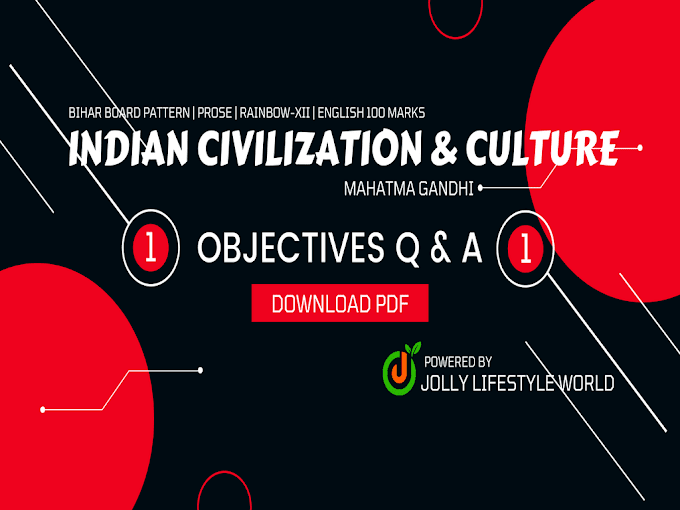Story of English Language Important Objectives
# Choose the correct answer -
- The English language is much younger than ...............
- Sanskrit
- Greek
- Latin
- All three. [Ans. (4)]
- Who were called together the Anglo-Saxons?
- Angle
- Saxons
- Jutes
- All three. [Ans. (4)]
- The Anglo-Saxons invaded English in the .............
- fifth century
- Sixth century
- seventh century
- None of these. [Ans. (1)]
- Who gives England its name and language?
- Romans
- Indians
- Anglo-Saxons
- None of these). [Ans. (3)]
- The term 'English' was derived from the name .................
- Angles
- Angels
- Triangles
- None of these. [Ans. (4)]
- Chinese is spoken by more than ............. people.
- 8 million
- 9 million.
- 10 million
- 11 million. [Ans. (1)]
- English is spoken as mother-tongue by more than .............
- 2 million
- 3 million.
- 4 million
- 5 million [Ans. (pending)]
- The history of the English language is just about ........... years old.
- 13 hundred
- 14 hundred.
- 15 hundred
- 16 hundred. [Ans. (3)]
- Middle English covers ..............
- AD 449-AD 1066
- AD 1067-AD 1099
- AD 1100-AD 1149
- AD 1150-AD 1500. [Ans. (4)]
- In England, Printing Press was invented in ...........
- 1476
- 1486
- 1496
- None of these. [Ans. (1)]
- Old English period covers ..................
- AD 449 to AD 1066
- AD 459 to AD 1066
- AD 469 to AD 1066
- AD 479 to AD 1066. [Ans. (1)]
- The Norman Conquest in England to place in ............
- AD 1056
- AD 1066.
- (c) AD 1076
- AD 1086. [Ans. (2)]
- In the OE period, the two major influences were .....................
- Latin and Greek
- Latin and French
- Latin and Scandinavian
- Latin and Indian. [Ans. (3)]
- About ............ Christianity began to spread in English.
- AD 300
- AD 400.
- AD 500
- AD 600. [Ans. (4)]
- The golden period of Old English literature was the era of ...........
- King Alfred
- King Richard-II
- King Edward-III.
- Queen Elizabeth. [Ans. (1)]
- Middle English period is accepted to be from ..............
- AD 1150-AD 1500
- AD 1250-AD 1500.
- AD 1350-Ad 1500
- Ad 1450-AD 1500. [Ans. (1)]
- The printing press was set up by William Caxton at the Westminster Abbey, English in ..........
- 1466
- 1476
- 1486
- 1496. [Ans. (2)]
- The first phase of Middle English literature covers the period ............
- AD 950-Ad 1215
- AD 1050-Ad 1215
- AD 1150-AD 1215
- None of these. [Ans. (3)]
- The second phase of Middle English literature covers the period ...............
- AD 950-AD 1350
- AD 1050-AD 1350.
- AD 1150-AD 1350
- AD 1250-AD 1350. [Ans. (4)]
- The notable literary figures of the third phase or the second half of the 14th century (AD 1340-AD 1400) are .........
- Chaucer
- Gower
- Langland
- All. [Ans. (4)]
- Modern English begins from ...............
- AD 1500
- AD 1600
- AD 1700
- AD 1800. [Ans. (1)]
- The printing technology was introduced in English in ..................
- 1466
- 1476.
- 1486
- 1496. [Ans. (2)]
- By the ........... the number of the reading public had risen considerably in England.
- 13th and 14th centuries
- 15th and 16th centuries.
- 17th and 18th centuries
- 19th and 20th centuries. [Ans. (3)]
- .............. was also known as the Augustan Age.
- 15th century
- 16th century.
- 19th century
- 18th century. [Ans. (4)]
- The British Grammar was written by J.Buchanan in ................
- 1762
- 1772
- 1782
- 1792. [Ans. (1)]
- ........... has the largest number of native speakers.
- Chinese
- English
- Hindi
- Urdu. [Ans. (1)]
- In the UK, the USA, Ireland, Canada, Australia, New Zealand and South Africa, English is spoken as a ....................
- second language
- mother-tongue.
- foreign language
- None of these. [Ans. (2)]
- In India, Singapore, Malaysia, Nigeria, Namibia, Botswana, etc., English is spoken as a ..................
- mother-tongue
- foreign language.
- second language
- None of these. [Ans. (3)]
- English is also used as a ....................... by the Angle-Indian community of India.
- mother-tongue
- second language.
- foreign language
- None of these. [Ans. (1)]
- In China, Japan, USA, Saudi Arabia, Egypt, Iraq, Eritrea, France, Germany, Switzerland, Mexico, Brazil etc., English is spoken as a .................
- second language
- foreign language.
- mother-tongue
- None of these. [Ans. (2)]
- English developed from the speech of the ....................
- Anglo-Saxon
- Anglo-Indian.
- Anglo-America
- None of these. [Ans. (1)]
- Standard British speech is known as ......................
- AP
- RP
- IP
- None of these. [Ans. (2)]
- There are ............... main effects of the worldwide spread of English.
- Three
- Four
- Two
- Five. [Ans. (3)]
- America English differs from British English in the sphere of ................
- Vocabulary
- Grammar.
- Spelling
- All of three. [Ans. (4)]
- The second effect of the spread of English was the development of 'new Englishes' like ...................
- Indian English, Nigerian English, etc.
- Indian English, Sri Lankan English, etc.
- Indian English, Pakistani English, etc.
- Indian English, Chinese English, etc. [Ans. (1)]
- About ............ years ago, Latin was a world language.
- 800
- 900.
- 1000
- 1100. [Ans. (1)]
- With the fall of the Roman Empire, ............. became a language no longer in popular use.
- French
- Latin.
- Greek
- Spanish. [Ans. (2)]
- In the last few decades of the ............ century, the English Language has seen rapid changes.
- 18th
- 19th.
- 20th
- None of these. [Ans. (3)]
- Global Standard English will be one common language of the world for use in future.
- International travel and tourism.
- Means of communication between governments.
- Multinational business organisations.
- all the three. [Ans. (4)]
- In the last decades of the 20th century, the earlier concept of Standard English .............. have been diluted.
- Grammar
- Spelling.
- Pronunciation
- All three. [Ans. (4)]
- Who wrote the following lines:-
- "Now the leaves are falling fast,
- Nurse's flowers will not last"
- D.H. Laurence
- Wordsworth.
- W.H. Auden
- None of these. [And. (3)]
- 'The Canterbury Tales" was written by ....................
- Chaucer
- Langland.
- Yeats
- None of these. [Ans. (1)]
- 'The Faerie Queen' was written by ..................
- Arnold
- Tennyson.
- Spenser
- None of these. [Ans. (3)]
- Dr. Faustus was written by ...............
- Christopher Marlowe
- Shakespeare
- Keats
- None of these. [Ans. (1)]
- Edward-II was written by ................
- Spenser
- Marlowe.
- Milton
- None of these. [Ans. (2)]
- 'Venus and Adonis' was composed by ...............
- Shakespeare
- Milton.
- Keats
- None of these. [Ans. (1)]
- 'Hamlet' is a ................
- comedy
- tragedy.
- farce
- None of these. [Ans. (2)]
- 'King Lear' is a ..................
- novel
- drama
- poetry
- None of these. [Ans. (2)]
- 'Paradise Lost' was written by .....................
- Dickens
- Spenser
- Milton
- None of these. [Ans. (3)]
- 'Paradise Regained' was written by ......................
- Milton
- Shakespeare
- Keats
- None of these. [Ans. (1)]








1 Comments
Nice Blog! Searching for spoken english classes in Panchkula? We provide personalized attention and interactive sessions, ensuring effective learning. Whether you’re a student preparing for exams, a professional aiming for career growth, or someone looking to boost personal skills, spoken English classes cater to all. Experienced trainers focus on improving fluency, pronunciation, vocabulary, and grammar, ensuring that learners can express themselves clearly in everyday conversations. With the help of experienced trainers, students engage in interactive sessions, role-plays, and discussions to build confidence in speaking English.
ReplyDeleteEnter Your comment or ask any doubt...
Emoji